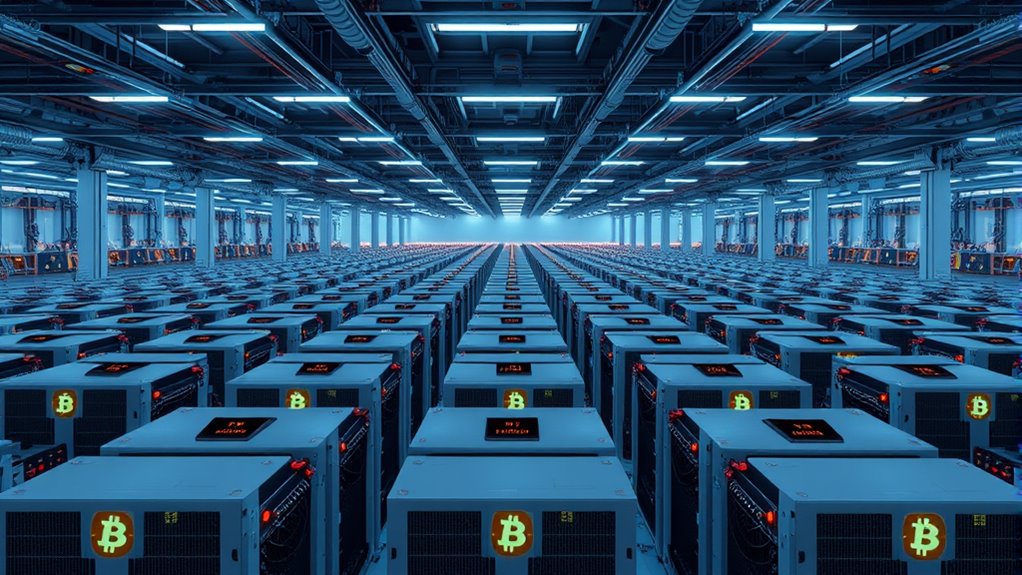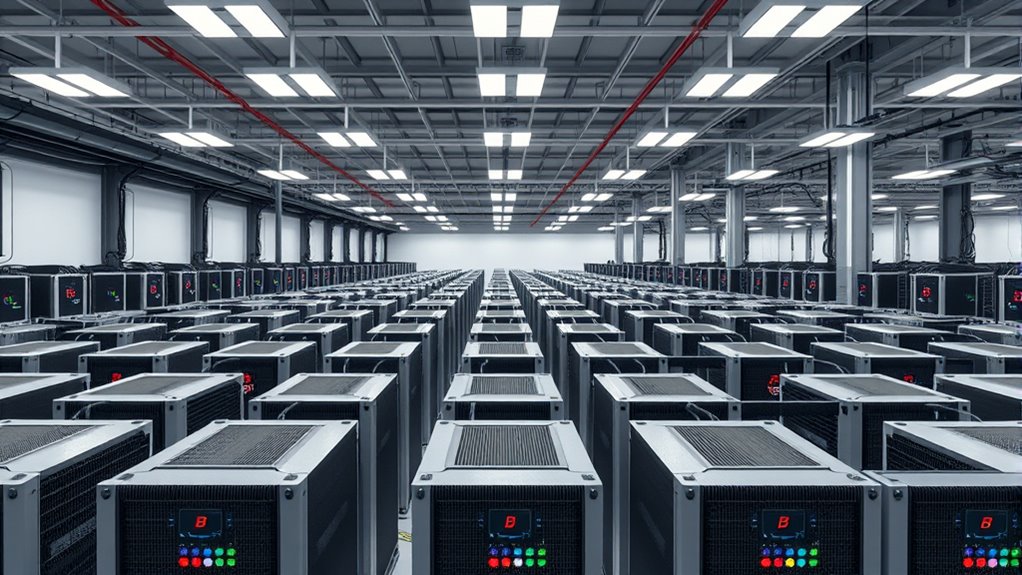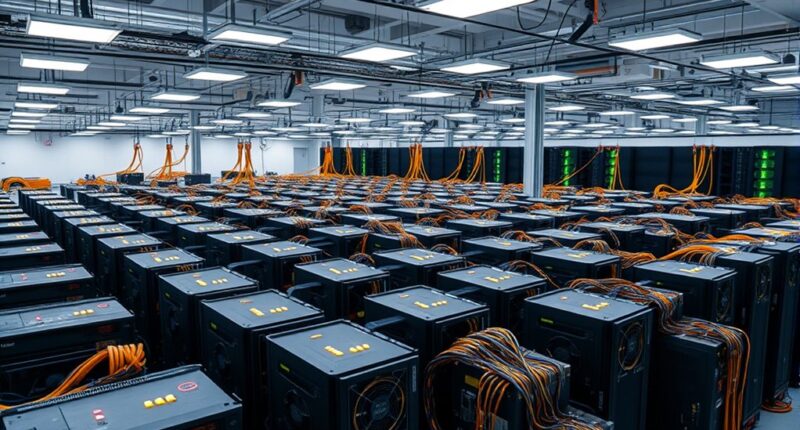Block’s decentralized bitcoin mining system aims to make mining more accessible, efficient, and resilient by introducing innovative hardware and open-source software. Its modular rigs are easy to upgrade and repair, reducing costs and downtime. The system also integrates seamlessly with bitcoin payment solutions, supporting broader ecosystem growth. This approach promotes decentralization, enhances network security, and could reshape the industry. To understand how this initiative could impact your involvement in bitcoin, keep exploring the details.
Key Takeaways
- Square (Block) introduces a decentralized bitcoin mining system aimed at democratizing access and reducing reliance on centralized farms.
- The system features modular, open-source hardware and software for easy upgrades, maintenance, and community-driven customization.
- It employs advanced 3nm chips for high efficiency, resilience, and extended equipment lifespan.
- Integration with Bitcoin ecosystem tools, including Lightning Network and merchant payment solutions, enhances bitcoin utility.
- The initiative aims to reshape industry power dynamics, promote security, and foster innovation in decentralized mining.
The Vision Behind Block’s Decentralized Mining Initiative

The vision behind Block’s decentralized mining initiative is rooted in making bitcoin mining more accessible, efficient, and resilient. You’re empowered to participate regardless of your location or scale, breaking down traditional barriers like high costs and technical complexity. Block aims to democratize the process, enabling anyone to buy, set up, and operate mining rigs with ease. This approach reduces reliance on centralized mining farms, which can be vulnerable to disruptions. By decentralizing, the system enhances the security and resilience of the bitcoin network. You’re invited to join a more inclusive ecosystem where participation isn’t limited to large corporations. Ultimately, the goal is to foster a resilient, distributed network that benefits all users and supports the broader adoption of bitcoin. Additionally, incorporating decentralized systems can improve the overall robustness and network security of bitcoin infrastructure.
Innovative Hardware and Software Solutions for Mining Efficiency

Innovative hardware and software solutions are at the core of Block’s effort to boost mining efficiency. You benefit from the Proto Rig’s modular design, which extends equipment lifespan and reduces upgrade costs. Its tool-free, quick-repair features minimize downtime, keeping your operations running smoothly. The system’s focus on heat dissipation, noise reduction, and dust management ensures reliable performance even in home settings. Power efficiency is optimized with advanced 3-nanometer chips, balancing high hashrates with lower energy consumption. Complementing this hardware, the open-source Proto Fleet software streamlines management across large mining operations. It consolidates power scaling, diagnostics, and monitoring into a single platform, reducing operational complexity and costs. Incorporating Personal Growth principles such as mindfulness and stress management can further enhance operational focus and resilience. These innovations work together to improve overall efficiency, making bitcoin mining more accessible, sustainable, and cost-effective.
Enhancing Accessibility With Modular Rig Design and Open-Source Management

Modular rig design and open-source management considerably boost accessibility by simplifying how you buy, upgrade, and operate mining equipment. With modular rigs, you can easily replace or upgrade components, extending hardware lifespan and reducing costs. Open-source management tools like Proto Fleet streamline control, diagnostics, and power scaling, eliminating the need for multiple proprietary systems. This openness encourages community collaboration, transparency, and customization, making mining more adaptable to your needs. Additionally, safety considerations are enhanced through transparent and community-driven development, ensuring more reliable and secure systems.
Integrating Mining With Bitcoin Payments and Ecosystem Growth

Building on the advancements in hardware accessibility and management, Block is now focusing on integrating bitcoin mining with its broader ecosystem of payments and financial services. By combining mining with Square’s payment solutions, you can seamlessly convert sales into bitcoin, boosting merchant adoption and increasing bitcoin’s utility. The Bitcoin For Businesses feature automates conversions, making it easier for merchants to participate in the ecosystem. Additionally, Lightning Network integration enables near-instant, low-cost bitcoin transactions, supporting everyday use. This synergy encourages more users to mine, spend, and hold bitcoin within a unified platform. As mining becomes more accessible and integrated with payments, you help foster a decentralized bitcoin economy—one that promotes financial inclusion, resilience, and growth across communities. Incorporating well-being tips, such as stress management techniques, can also enhance the overall experience of participating in this ecosystem.
Strategic Implications and Future Outlook for Decentralized Bitcoin Mining

As decentralized bitcoin mining gains momentum, its strategic implications could reshape the industry’s power dynamics and network resilience. You might see increased democratization, reducing reliance on large mining farms and promoting broader participation. It could also enhance security by dispersing mining power globally, making the network more resistant to censorship or attacks. Decentralization may drive innovation, pushing hardware and software advancements that lower costs and environmental impact. However, challenges like coordination, regulation, and resource distribution remain critical. Attention in creative practice can be cultivated to foster innovative approaches and solutions within this evolving landscape.
Frequently Asked Questions
How Will Decentralized Mining Impact Bitcoin Network Security and Stability?
Decentralized mining boosts bitcoin network security and stability by spreading out control and reducing reliance on a few large players. You’ll see increased resistance to attacks and censorship, as more miners participate globally. With a diverse, distributed network, transaction verification becomes more resilient, and the risk of a 51% attack diminishes. This broader participation helps maintain the network’s integrity, ensuring it remains trustworthy and robust over time.
What Partnerships Are Essential for Deploying Block’s Mining Ecosystem Globally?
You’ll find that strategic partnerships are vital for deploying Block’s mining ecosystem globally. Collaborating with hardware providers ensures access to cutting-edge tech, while working with energy companies guarantees sustainable power solutions. Partnerships with regulatory bodies help navigate legal landscapes, and alliances with other crypto firms boost network resilience. These collaborations create a seamless, scalable infrastructure, making decentralized mining accessible worldwide and strengthening Bitcoin’s decentralization and security.
How Does the Modular Design Affect the Total Cost of Ownership Over Time?
The modular design lowers your total cost of ownership by extending equipment lifespan to about 10 years, compared to traditional rigs. You save on replacement costs and reduce downtime with quick, tool-free repairs. The replaceable hashboards make upgrades more affordable, cutting costs by 15–20%. Plus, improved durability and easier maintenance mean fewer disruptions, helping you maximize efficiency and profitability over time while minimizing ongoing expenses.
Will the Open-Source Software Enable Community-Led Innovations?
Imagine the open-source Proto Fleet software as a fertile garden, ready for community seeds to grow. Yes, it’ll enable community-led innovations, acting like a catalyst for collective creativity. When everyone can tweak, improve, and customize, the ecosystem becomes a vibrant landscape of ideas. Your participation fuels this growth, turning shared knowledge into breakthroughs that push mining technology forward and make the whole system stronger and more adaptable.
What Regulatory Challenges Might Influence the Rollout of Decentralized Mining?
You’ll likely face regulatory challenges like ambiguous rules around mining hardware, licensing, and energy use, which could delay or restrict deployment. Governments may impose stricter environmental regulations, especially on power consumption, or require compliance with data security and financial laws. You should stay informed on evolving policies, engage with regulators early, and adapt your operations to meet legal standards, ensuring smoother rollout and avoiding costly penalties or bans.
Conclusion
By embracing decentralized mining, you’re helping to secure Bitcoin’s future. With over 70% of mining power now controlled by large pools, your participation in initiatives like Block’s can shift the balance towards true decentralization. This innovative system not only boosts accessibility but also empowers individual miners. As more people get involved, you’re contributing to a more resilient, censorship-resistant Bitcoin network—making the future of decentralized mining both exciting and essential.








